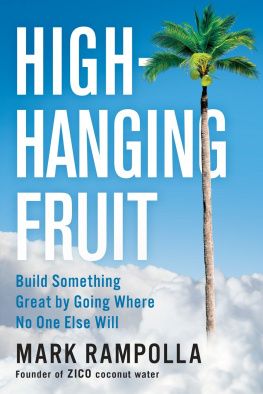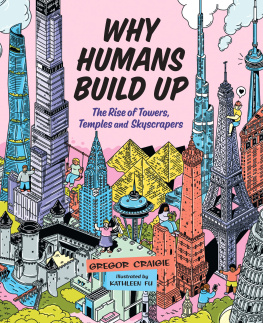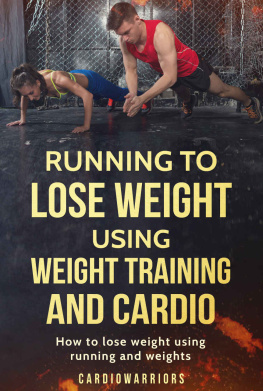Penguin supports copyright. Copyright fuels creativity, encourages diverse voices, promotes free speech, and creates a vibrant culture. Thank you for buying an authorized edition of this book and for complying with copyright laws by not reproducing, scanning, or distributing any part of it in any form without permission. You are supporting writers and allowing Penguin to continue to publish books for every reader.
Names: Rampolla, Mark, author.
Title: High-hanging fruit : build something great by going where no one else will / Mark Rampolla.
Identifiers: LCCN 2016017393 | ISBN 9780399562129 (print) | ISBN 9780399562143 (ebook)
Subjects: LCSH: Rampolla, Mark. | Social entrepreneurship.
To my parents, who showed me what it means to reach higher.
O n an unusually warm and clear Saturday morning for December in San Salvador, we drove to the beach to meet friends for the day. The air was filled with that uniquely sweet Central American scent comprising notes of jasmine, bougainvillea, tropical humidity, crushed sugar cane, and burning trash. After several years living here it now smelled like home. Maura was asleep in the passenger seat. Six months into her second pregnancy she was struggling with an all-day version of morning sickness. Ciara, our eighteen-month-old, was conked out in her rear-facing car seat behind us. My work for International Papers (IP) packaging business had taken me to Argentina and Venezuela that previous week, and I was tired myself and looking forward to catching a few zs in one of the hammocks strung between coconut trees at the little beach house that would be our refuge for the day.
As we descended from the mountains to the coastal plain, I could feel my ears pop and the temperature rise. We drove into the sleepy port town of La Libertad. Maura awakened out of her slumber and spotted a roadside vendor, saying, Agua de coco! Thats something I can drink. Can we stop? I said sure, but reminded her that we were only ten minutes from the house. You know Jorge will have one ready for you in five minutes and you can drink it while floating in the pool.
Ah, that sounds perfect, Maura said. Keep going.
I pulled up to the tall blue gate we knew well and beeped twice. Jorge, the property manager, opened the gate and ushered us in. We chatted a little and I asked him if he could get us a bunch of coconuts for the day: Maura est un poco enferma. He said back to me, Qu lastim. Agua de coco fresca es exactamente lo que ella necesita!
After we parked, we watched as Jorge picked one of the coconut trees to harvest. He tightened a rope between his feet, wrapped his arms and knees around the trunk, and expertly shinnied up twenty-five feet or so to the top. He pulled out a machete from the sheath strapped to his waist and hacked away at a branch. Down fell a bunch of five or six coconuts still attached together.
By the time I helped Maura from the car and took Ciara out of her seat, Jorge had hauled the coconuts to the palapa by the pool. Holding one in his hand, he used the same machete to slice the husk little by little until he breached its tender shell. I took a picture of Ciara standing, staring down, fascinated at the bunch of coconuts on the ground, while Jorge put a straw inside one and handed it to Maura. She took a long drink, thanked him, and melted into one of the lounge chairs.
Within the hour, our group of friends was sitting poolside. There was Don, the deputy director of the Peace Corps, and his wife Candy, who was an executive with Save the Children. They owned the house. Dave and Terry, who both worked at the U.S. Embassy in San Salvador, were there. Lane and Kelly and their kids, who had recently moved from El Salvador to Guatemala, were the last to arrive. Lane was country director of Catholic Relief Services (CRS) and Kelly consulted for UNICEF. I loved hanging out with this group, although their professional dedication to good works and higher callings sometimes made me wonder if I was doing enough with my life.
As we floated in the pool, we chatted about typical expatriate themes: safety, the economy, local politics, and the latest stomach illnesses. Inevitably, the conversation drifted to what we planned to do next in our lives. Expats tend to be transients, usually staying only a few years in a given job or location. Most of us had been in the country for at least two years and were all beginning to plan what came next.
Dave, we learned, was being considered for a big promotion that would take him to Colombia. Terry wanted to move to Indonesia and hoped to shift from the consular section to the economic development track. Lane and Kelly talked about their dreams to move to Ecuador or Africa and continue their work for the poor. Whats next for the Rampollas? Terry asked.
The question was timely. Wed been living in El Salvador for almost three years, and Maura and I talked constantly about the paths we might take: what was best for our young family, our careers, and us as a couple. Maura could do her public health consulting work from anywhere, but for me, I admitted, Thats a tough one.
I told them that work at IP was going well and that Id likely soon be running all of Latin America for my division, which made it worth staying a few more years. Then I would be ready to move on, and it looked like there might be opportunities for me in Europe or Brazil.
So it sounds like youre on your way, Terry said.
I guess, I said, but... I looked around at the group. The truth is that I dont know that paper and packaging is really what I want to dedicate my life to. If I leave IP, I guess my next logical career move would be to run the Latin America operations for some big U.S. company. But I know what that job would mean: We live in Miami and I travel one hundred to two hundred days per year. And for what? So I can make a ton of money for the company, some for us, work my way up the ladder, and eventually retire and spend my days golfing? Thats not what either of us want, so Im not really sure what were going to do.
Maura, worried that I was heading into an existential crisis, chimed in: Mark, theres a million things you can do. And yes, many of them are more interesting and inspirational than packaging.
Maybe its time for me to move to the nonprofit world, I said. Maybe Ill return to the Peace Corps and take over for Don when he retires. Or Lane, could you find me something at CRS?
Mark, youd be great in nonprofit but I think youd be frustrated. Change is incremental and slow and it can be very political, Lane said. With your background and experience I think you can make a bigger impact in the private sector.
I thought back to my Peace Corps experience as a small business development consultant in Costa Rica. No doubt, I helped change a few lives but on a frustratingly small scale. I had always struggled with how to reconcile my belief in making a social impact with my interest in business. My dad was a nuclear physicist and my mom a counselor, artist, and teacher. Morality, spiritual purpose, social responsibility, and even war and poverty in El Salvador were regular dinner table conversations in our Italian/Irish Catholic family. My parents also practiced what they preached, taking us to swim at the all-black public pool in town, bringing an unwed teenage mother to live with us, and adopting a Bosnian refugee family from the Yugoslav wars.








